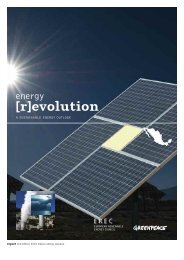download the turkey energy revolution scenario
download the turkey energy revolution scenario
download the turkey energy revolution scenario
Create successful ePaper yourself
Turn your PDF publications into a flip-book with our unique Google optimized e-Paper software.
GLOBAL ENERGY [R]EVOLUTION<br />
A SUSTAINABLE TURKEY ENERGY OUTLOOK<br />
4<br />
<strong>energy</strong> resources & security of supply | RESERVES & POLITICS IN TURKEY<br />
<strong>turkey</strong>: rich in its domestic reserves, poor in politics<br />
Turkey has few economic gas and oil reserves, however, it is <strong>the</strong> first<br />
country in Europe with <strong>the</strong> potential of a complete renewable<br />
<strong>energy</strong> <strong>scenario</strong>. Unfortunately, current politics do not offer this as<br />
a long term vision, but instead, rely on solving <strong>the</strong> short term<br />
security issues surrounding supply and demand.<br />
Turkey’s current <strong>energy</strong> strategy is based on becoming an <strong>energy</strong><br />
hub between east and west via oil and gas pipelines. However, this<br />
strategy does not allow Turkey to focus on long-term investment on<br />
its own domestic resources, resulting in <strong>the</strong> security of supply -in<br />
political terms, <strong>energy</strong> independence- becoming a major problem.<br />
Short sighted <strong>energy</strong> policies in <strong>the</strong> last decade have proven that<br />
increasing imports in gas and oil have rendered <strong>the</strong> economy more<br />
fragile to political tensions -especially with Russia. As well, <strong>the</strong><br />
country’s current account deficits have risen due to <strong>energy</strong> imports.<br />
Moreover, <strong>the</strong> current legal system does not encourage maximum<br />
efficiency with <strong>the</strong> use of oil and gas technology. The majority of<br />
Turkey’s lignite reserves are of low quality due to low <strong>the</strong>rmal value<br />
and high pollution content. Thus, <strong>the</strong> industry recently turned to<br />
imported coal, which is also increasingly dependent on oil prices, as<br />
<strong>the</strong> markets become global. Increasing <strong>the</strong> diversity of suppliers is<br />
considered as an option to ease <strong>the</strong> threats to security of supply.<br />
However, unless strong efficiency measures are taken, and domestic<br />
renewable energies are exploited, primary <strong>energy</strong> demand will<br />
remain one of <strong>the</strong> biggest causes of deficit in <strong>the</strong> national exportimport<br />
scheme.<br />
In preparing our alternative <strong>scenario</strong>, we limited <strong>the</strong> increase in gas<br />
demand by 2030 -<strong>the</strong> last year of most of <strong>the</strong> gas supply contracts<br />
with Russia and Iran-. We also kept <strong>the</strong> gas and crude oil demand<br />
lower than <strong>the</strong> reference <strong>scenario</strong> by increasing <strong>the</strong> efficiency<br />
standards in <strong>the</strong>ir technologies (ex: CHP and transport vehicles).<br />
It is obvious that a climate friendly <strong>energy</strong> future helps also <strong>the</strong><br />
economy by decreasing <strong>the</strong> deficits in <strong>the</strong> import-export schemes<br />
and creates wider security of supply.<br />
© HANSEN/DREAMSTIME<br />
image NUCLEAR REACTOR IN LIANYUNGANG, CHINA.<br />
22


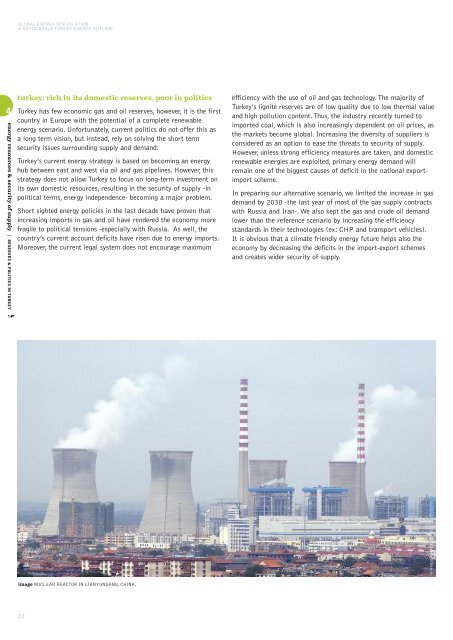
![Energy [R]evolution - European Commission](https://img.yumpu.com/49109324/1/184x260/energy-revolution-european-commission.jpg?quality=85)
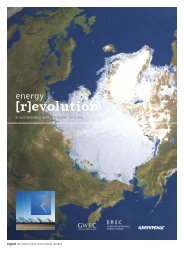
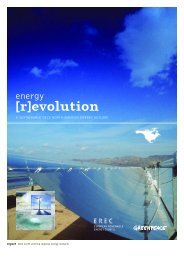
![5905 gp [eu rev]csfr4.qxd - Energy [R]evolution](https://img.yumpu.com/42305023/1/184x260/5905-gp-eu-revcsfr4qxd-energy-revolution.jpg?quality=85)
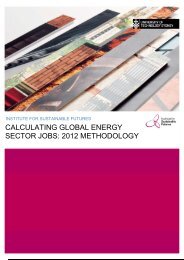
![5905 gp [eu rev]csfr4.qxd - Energy [R]evolution](https://img.yumpu.com/28729264/1/184x260/5905-gp-eu-revcsfr4qxd-energy-revolution.jpg?quality=85)
